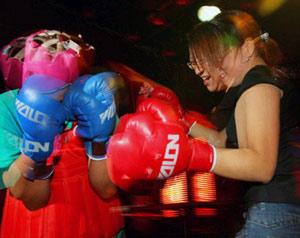|
如何表達“郁積的憤懣”?
[ 2006-08-09 10:54 ]
南京的讀者應(yīng)該對這幅圖片見怪不怪。近日,南京首家“泄憤吧”在升州路某夜總會開業(yè),圖片中,郁悶美眉正對“泄憤模特”拳打腳踢,以發(fā)泄心頭郁積的憤懣。

請詳看圖片說明:A customer (R) attacks a staff member at the Rising Sun Anger Release Bar in Nanjing, capital of east China's Jiangsu Province August 7, 2006.
Stressed-out Chinese can now unleashpent-up angerat a bar that lets customers attack staff, smash glasses and generally make a ruckus, a Chinese newspaper reported on Monday. The Rising Sun Anger Release Bar in Nanjing employs 20 muscled young men as "models" for customers to punch and scream at.
隨著生活節(jié)奏加快、工作競爭壓力增大,人們心頭的郁悶也是越積越多,pent-up anger恰到好處地形容了郁積在高壓之下的憤懣。
Pent-up(壓抑的)由動詞詞組pen up衍生而來,pent是pen的過去分詞。Pen除了表達“鋼筆”外,還可用來形容“柵欄;把…關(guān)起來”,如The desire to travel has been pent up for the last two years.(近兩年來,心中老是憋著想出門旅行的念頭)。
另外,pent-up常用來形容emotion(情感)、love(愛)、hatred(仇恨)等情感名詞,而“釋放、發(fā)泄”這些情感則常用release,unleash等動詞來表達。
點擊進入:往期回顧
(英語點津陳蓓編輯)
|